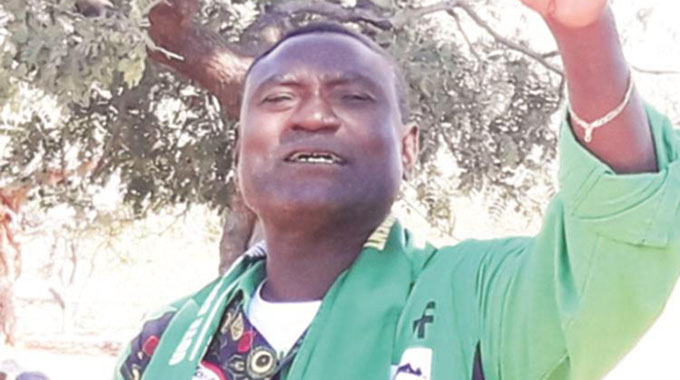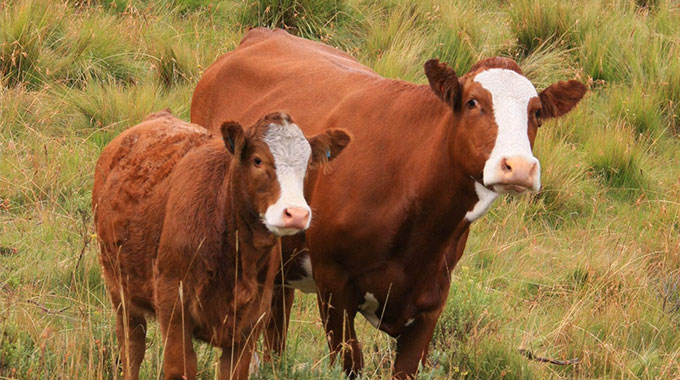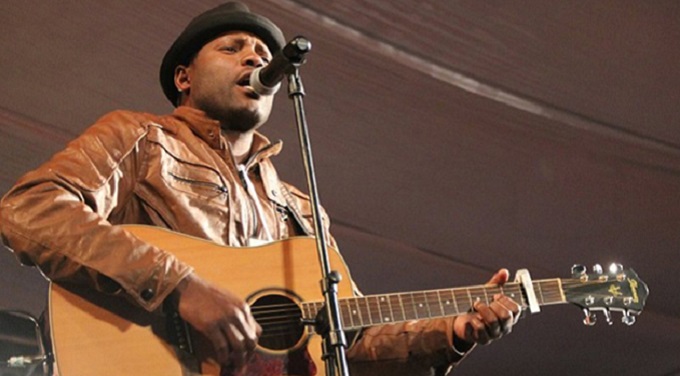Nguluvhe details Manama recruitment

Nduduzo Tshuma, Political Editor
IN January 1977, the ring of a bell, usually alerting pupils at Manama High School in Gwanda District, Matabeleland South, of the time to go to the dining hall for supper, signalled a new chapter for the learners who were about to join the liberation war.
Among the pupils, estimated to be 400, was a young Albert Nguluvhe who was meant to start his form three that year.
He was taken together with his classmate (now Foreign Affairs and international Trade Minister Dr) Sibusiso Moyo, (Airforce of Zimbabwe commander Air Marshal) Elson Moyo who was a year their senior, (former minister) Chiratidzo Mabuwa who was their junior, Cde Mercy Sibanda the wife of the Commander Zimbabwe Defence Forces General Phillip Valerio Sibanda and many others.
Cde Nguluvhe, a career security man who joined the Central Intelligence Organisation in 1981 where he rose through the ranks to the director of national security at the time of his retirement in 2018, recollected how the Zipra forces took them from the Evangelical Lutheran Church in Zimbabwe-owned Manama Mission.
Cde Nguluvhe who is now the Zanu-PF Beitbridge East legislator said he started his Form 1 in 1975 and that time about five pupils had left school to join the liberation struggle.
He said the departure of the five inspired the pupils to discuss politics what was happening in the country.
“During the Christmas holidays in 1976 I met, for the first-time, (Zanla) comrades from Mozambique at my rural home at Chapongwe. That was my first time to meet comrades, and they wanted to meet my father. Unfortunately, my father was not in Zanu but was in Zapu as the district chairperson in the area and his young brother was his deputy,” said Cde Nguluvhe.
“Nevertheless, the comrades from Mozambique were well received and my father slaughtered a beast and they stayed for a week without people knowing of their presence until they started hosting those pungwes. I attended two pungwes and they addressed us and that inspired me, they used to tell us that ‘we can’t be shot, we disappear’.”
Cde Nguluvhe said in January 1977, they went to school for the start of the first term for his Form 3.
“We paid our fees but I think people somehow knew we would be leaving because fellow pupils used to carry money with them. One evening, a bell was rung for us to go to the dining hall but when everyone had reported to the assembly to proceed to the dining hall, we saw teachers also reporting for the assembly point,” he said.
“That is when the comrades addressed us, I think they were about a section that we saw and they said madoda sesiya empini okwesikolo liyatshiya, you know because we were young, there was so much excitement among the pupils, we were not allowed to go back to the dormitories and off we left.”

Cde Nguluvhe said they set off using a path leading to Tuli until they reached a shop owned by a local who gave the Zipra fighters food supplies.
“We continued walking through the night until we reached Shashe River in the morning. The comrades flanked us as we walked. As we were crossing in the morning, the Rhodesians spotter planes were flying over us and that was the first time I heard the term ‘take cover’ as the comrades instructed us to hide from the planes. We managed to cross the river into Botswana and proceeded to Gobajangu until we reached Bubonong.
“When we got into Botswana, more Rhodesians started to come, we discovered that those Comrades had AKs, they spoke to us before they left us with a few comrades armed with pistols. They said we are now going to war,” said Cde Nguluvhe.
“The planes flew over us but they didn’t bomb us. The Botswana police ferried us using their trucks to Francistown and when we got to Francistown, within a day or two, the Rhodesians sent a bus with parents to plead with us to come back home. We had gone with our teachers like Cde Obert Matshalaga, Chitima, and a Chizano if I’m not mistaken. When the buses came, I think about 50 pupils went back to Rhodesia with one teacher. The rest said we are going to war and within a week we were flown to Lusaka and then taken to a camp called Nampundu.”
Cde Nguluvhe said in Zambia, the reality of war kicked in.
“That is where things started changing as reality of the war struck, we had high expectations but from the flight from Francistown we were ferried by the Zapu trucks and arrived at the camp in the evening. The guerillas changed on us, the language changed and the treatment too, they said the povo life was over, school was over.
“They introduced us to military life, rolling in the mud, crawling and living in barracks built with logs, there were no more beds but we were now sleeping on elephant grass and each given one blanket,” said Cde Nguluvhe.
“Early in the morning at around 4am, you are woken up for training, toyi toying. We were made to get logs that we used as guns for training purposes, we were told never to lose that log. When going for food, we went toyi toying in a single file. Life had changed, I fell sick with malaria in the process but I survived.”
Cde Nguluvhe said Zapu leader Dr Joshua Nkomo addressed them before they were divided into groups based on age.
“I was a little older so I joined the group of the old ones and were taken to the GTC camp for further training. Our commander was the present-day Commander Defence Forces General Phillip Valerio Sibanda and the other commanders were Goronga, who is late, the late Eddie Sigoge Mlotshwa, and Masilo whom I later discovered to be my relative, he is late now. Our security was provided by comrades who had trained in Mwembeshi.
“We trained at CGT up to September but before we finished, we received intel on a plan to bomb the camp and we moved and set up another one called CGT 2. It is where our pass out parade was held and Nkomo and Nikita Mangena attended. We were then separated into groups for specialist training. I was selected among a group of 15 that included the late (national hero) Zenzo Ntuliki who had trained earlier in Tanzania. He became part of us under the command of a comrade called Todd,” said Cde Nguluvhe.
“We were taken aside and addressed by (late national hero) Dumiso Dabengwa accompanied by Madlela and Gordon Butshe who told us that we were being sent for specialist training. We were taken to Lusaka and spent a few days as our travel documents were being processed before we were taken to Bulgaria at a place called Varna.
“We stayed there from September to March the following year and we were taught intelligence and security specialising in VIP protection. Our instructors were Bulgarians with some coming from the KGB in the Soviet Union. That group had Ethan Mathibela who is still alive, the late Felix Bonde and others.”
Cde Nguluvhe said after training, they we went back to Lusaka via Angola where he was deployed to security at Zimbabwe House under the command of Sam Madondo, who he described as a very tough man.
“I remember there were some comrades who wanted to rebel against the leadership in Nampundu. We were trained now and well-armed and we went there to get them and interrogated them on the source of their actions. We would also come with comrades up to the Zambezi.
“I was withdrawn at around June or July and attached to Nkomo because they wanted people who had specialised training in security because before us he was guarded by people who were trained as guerillas. He would at times attach me to his deputy Chinamano and for a day or two I would be there but we slept at Nkomo’s residence providing security.”
Cde Nguluvhe was part of the security team at Dr Nkomo’s residence when it was attacked by the Rhodesian forces in April 1979 in a failed attempt on the life of Umdala Wethu.
“When the Rhodesians came, they painted their rovers just like the Zambian army trucks. When we got to Zimbabwe House, the lead car would park on the side and Umdala’s car would get in and then an accompanying car would also get in. We did the same but the day of the attack, Dabengwa had already got the intel but they didn’t tell us, they just told us to be alert. They took uMdala and went with Ben Tlou with a small car driven by a woman called Milda and a Cuban security officer. Fidel Castro had given us two security officers.
“We now had a rough idea that our situation was not good. We were alert, these guys attacked around 2 to 3am, the Rhodesians got to the gate and hooted and Cde Magwaza went to open the gate. He could not see the outside because the fence was covered with sacks so that no one sees inside. The house was surrounded by the State House, the golf course, barracks and the British Embassy. When he was about to ask who was hooting, the reply he got was gunfire. They hit his Russian hat and thought they had hit his head. That is when we returned fire towards the gate, as we fired at the gate we were then attacked from the back as we were surrounded and the house was bombed. The attackers were using small mortar bombs,” said Cde Nguluvhe.
“I want to tell you the truth, if Umdala was there, they could have killed him because within 10 minutes, they had blown open the gate and got in. We knew that anyone who was standing was not us and we started firing. It’s only that Zambians did not allow us to carry heavy arms but we had AKs only. If we had bazookas or light machine guns or Goryunov or grenade launchers, those cars would not have escaped because we could see the Rhodesian forces firing from those vehicles. The battle took about 30 to 40 minutes, they bombed the house and killed the commander and took his folded butt.
“Maphosa who was Nkomo’s driver was shooting from the house and he was shot and as he fell, he tried to balance with his AK that burnt him and he made some noise. Zenzo (Ntuliki) crawled and took him. There was a man called Bhala who was Mangena’s driver who decided to return fire from under the Land Rover but he was killed when the vehicle was hit by a bazooka.”
Cde Nguluvhe said they lost about four comrades but the Rhodesians later admitted that they faced heavy resistance.
“We saw traces of blood and some teeth but those Rhodesians, when shot, they would rescue each other. They left behind one vehicle which upon assessment, we discovered that they had applied paint for their trucks to look like those of the Zambian military.
“They were in groups, while some attacked us, they were also hitting the liberation centre. That is when Zipra commander Lookout Masuku decided to take his wife using a civilian car with one bodyguard.
“The Rhodesians hit his car not knowing that it was Lookout and their vehicle overturned, they came and said ‘ah we have hit Zambians’. I’m sure if they had known that it was Lookout who was our commander then, they would have taken him, when they heard his wife crying, they left him.
“There was confusion the following day as we thought Lookout had been captured,” said Cde Nguluvhe.
“After that we continued working with Nkomo. The Soviets quickly sent weapons after the attacks, for protection, those were nice weapons and had the Rhodesians come after we got those weapons, they would not have made it out alive.
“Remember when we were in Bulgaria we were trained in intelligence and security that also included urban warfare so we knew how to fight inside towns, we knew how to secure the leadership.
“I know the house (where Nkomo was hidden in the night of the attack,) that was secured by the late national hero Dr Sikhanyiso Ndlovu, we had to dig inside that house, where there was a rockery, we built a safe house there so that in the event of an attack, we would put him there. We didn’t sleep in the house anymore but outside so that when they got in, they would walk into the killing bags.”
Cde Nguluvhe said he continued working with Dr Nkomo until the Lancaster House talks where he also travelled with him.
“When they were just about to sign the agreement, because I was using a British passport, he decided that I come back to Rhodesia to make security arrangements for him. I came with a colleague, Newsreal. I smuggled a Makarov pistol in a radio, we used to like playing cassettes. I opened the radio and hid the pistol there. I later discarded the pistol in the early 1980s.
“I came as a student because even now my British passport is written student from Gwanda. We were received in Harare by the late national hero Cephas Msipa and we stayed at a hotel called Kambuzuma Garden Park, and later moved to Cde Msipa’s house in Lochinvar. We did all that was needed to be done in terms of security, we secured a vehicle, a Mercedes Benz that we were given by an Indian man, Mr Patel,” said Cde Nguluvhe.
“Of course, we had to make sure that all security arrangements were in place, to get in touch with the party youths. Umdala later arrived and had his first rally at Zimbabwe Grounds. Me and Newsreal organised that and received him, we went around the country.”
He said after the 1980 elections and when Dr Nkomo was Minister of Home Affairs, it was decided that they be integrated into the CIO.
Cde Nguluvhe also continued with school at Zimbabwe House taught by the late President Cde Robert Mugabe together with the likes of Dr Joice Mujuru and later attained a Degree in Criminology from the University of South Africa.
“The CIO then was under the Special Branch so you had to be a member of the police force. The police force said you can’t be a full member; you have to be auxiliary.
“We went to Morris Depot, some of our big commanders failed and maybe as I had gone up to form three, I passed and I was made an auxiliary patrol officer.
“We went back to Nkomo. In 1981, it was decided that we integrate intelligence services of Zipra, Zanla and the former regime. Umdala said he wanted me to join in training people and that’s when I joined the CIO as an instructor.
“It was hard, it was not easy, we had our colleagues from Zanla like Martin Ndlovu, we had VJ and former Police Commissioner Chihuri, we also had white instructors from the police,” said Cde Nguluvhe.
“The whites were inspectors and each had a car and we shared a car as blacks four of us as instructors and basically, they said we must only teach armament but of course when it came to VIP protection, we were better trained than them so we started teaching and eventually they left and we took over the training.
“I recall we were two instructors myself and VJ Huruve who trained members in VIP protection. The majority of the CIO members are my products, I trained them from 1981 up to 1992, I think.”
He was then moved to Gweru and served as a district intelligence officer for 10 months before he was promoted to a Provincial Intelligence Officer coordinating operations.
“I was then moved to PIO liaison or protective intelligence dealing with protection. I was made assistant director in charge of operations in 2001 until 2012 when I was made director of national security until I retired in 2018 in March. I thought I had done enough in almost 40 years in intelligence services.
“I thought I was now coming to do farming but I found myself in politics again. When I came here, I only managed to campaign for two days and I didn’t have any challenges in the primaries. In the elections we walloped the opposition,” said Cde Nguluvhe.










Comments